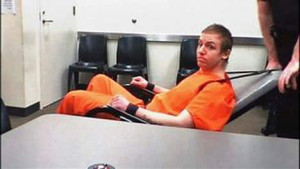Defendant Appointed 3 Different Lawyers, Stabs Each in Court
Many people undervalue the Sixth Amendment, the right to an attorney, until they’re arrested and accused of a crime. One man, however, does not seem to appreciate the work his attorneys did on his behalf. On January 2nd, 2012, Joshua Monson killed Brian Jones over a sale of methamphetamine. Monson was subsequently arrested and charged with possession of methamphetamine and second degree murder.
Attorney Tom Cox was assigned to represent Monson before Judge David Kurtz at the Everett Courthouse in Washington State. Monson borrowed a pencil while he waited in county jail. During the trial though, Cox was stabbed in the head by Monson with the pencil Monson had borrowed. Although Cox was not greatly wounded, Cox withdrew from the case and Judge Kurtz declared a mistrial. Gurjit Pundhar replaced Cox as Monson’s lawyer – and Monson also stabbed her in the head with a pencil. Judge Kurtz declared another mistrial and appointed a third attorney, Jesse Cantor, to represent Monson.
To ensure that the trial would proceed without another attorney stabbing, Kurtz ordered that an electrical cuff be trapped to Monson’s leg. Monson was always deprived of his weapon of choice, the county jail pencil. Although the state wanted Monson strapped down to a chair for good measure, Cantor argued against it, saying that the jury might be biased against Monson if they saw the defendant tied down to a chair like a mad man during the trial. Judge Kurtz agreed with the defense counsel.
During the prosecutor’s opening statement though, Monson obtained Cantor’s pen and stabbed Cantor in the head with the attorney’s own pen. Although Cantor wasn’t serious injured, Judge Kurtz declared that Monson had forfeited his right to an attorney and that Monson would be representing himself for the remainder of the trial – while tied down to a chair.
 I think many readers will have one of two reactions to this story: “Monson deserves it,” and/or “well duh he’s guilty.” Although it is true that Monson’s own conduct is the reason Monson can’t have an attorney, the law in Washington State leaves it to the trial judge’s own discretion. Judge Kurtz did not have to deprive the defendant of his right to an attorney. Although appointing Monson a new lawyer again is still an option, at this point it seems that Monson is playing games with the court. However, Judge Kurtz could have saved time by denying one of Monson’s previous attorney’s requests to withdraw from the case.
I think many readers will have one of two reactions to this story: “Monson deserves it,” and/or “well duh he’s guilty.” Although it is true that Monson’s own conduct is the reason Monson can’t have an attorney, the law in Washington State leaves it to the trial judge’s own discretion. Judge Kurtz did not have to deprive the defendant of his right to an attorney. Although appointing Monson a new lawyer again is still an option, at this point it seems that Monson is playing games with the court. However, Judge Kurtz could have saved time by denying one of Monson’s previous attorney’s requests to withdraw from the case.
Indeed, the case Judge Kurtz cited in support of his decision, State v. Fualaau, had the trial judge deny an attorney’s request to withdraw from the case despite the fact the attorney had been assaulted by his own client. The Fualaau judge had ruled that there were no conflicts of interest in having a lawyer represent a client who had just attacked the lawyer. Although the law did leave the decision up to Judge Kurtz, his decision could have gone the other way.
Before Monson’s final attorney was stabbed, that attorney had argued that Monson should not be restrained to his chair since the restraints themselves might cause the jury to believe that Monson was guilty. Readers might be tempted to conclude that Monson is guilty based on his behavior in court, and that the trial is just a formality at this point. Please dispense yourselves of this belief. The legal system serves two functions, functions which are undermined by false assumptions of guilt based on behavior outside of the crimes the defendant is charged with.
The first function served by the legal system is the discovery of whether the defendant committed a specific crime. This might sound extremely obvious, but many people will look at a trial and ask “is the defendant guilty?” That question, however, is not the proper one. The real question behind a criminal trial should be “is defendant guilty of the crimes he (or she) is charged with?” Yes, Mr. Monson is very likely guilty of assault, but the actual charges are possession of meth and second-degree murder. Possession of an illegal drug and murder are separate crimes from assault; neither the jury nor the public should conclude that Monson is guilty of murder or possession of an illegal substance based on a trio of assaults.
The second, and lesser known, function of the legal system is assigning the proper punishment to the proper crime. Punishment in order to give retribution for the victims, i.e. “an eye for an eye,” only works if the defendant loses the same amount the defendant deprived from the victims. If Monson is convicted of murder because of the assaults on the three attorneys, than the trial will not be a proper recognition of the loss of Brian Jones. The murder will be overshadowed and the victim’s sense that their loss is being corrected will be eroded. The rights of the victim are also deprived when the defendant loses his right to an attorney. Although criminal law is about the authority of the state and the defendant’s crime, it is important that the judge’s decision reflects the interests of all parties involved.


Comments